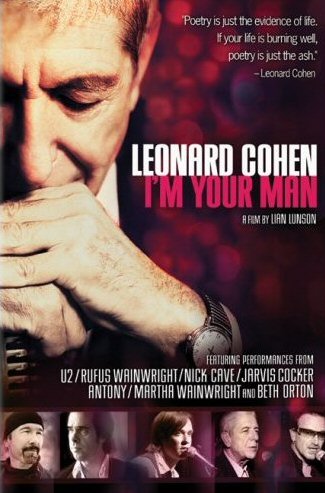|
I'M YOUR MAN - THE MOVIE  That’s How the Light Gets OutBy Walter Mosley
The difficulty of such a task issues from the fact that we, characters in life, are primarily unconscious creatures reacting to forces that we are neither aware of nor understand. The problem with most nonfictionists is that they believe they understand their subjects in all ways important and therefore leave little space for ambivalence or the trace elements of wisdom and folly. This is a problem because truth exists primarily in the margins of certainty and intention; truth, like life, is transient, ever-changing, and often at odds with its holders’ intentions and assumptions. There are few documentaries that present the whole story of a subject. Leonard Cohen: I’m Your Man is one such film. To begin with the decision to make a film about a concert of one man’s life work allows the viewer to experience that work, in this case in the hands of a variety of different singers and musicians, in the pure sense of live performance. By itself the concert was beautiful and worth documenting. Of course a concert is not a documentary. There is no sense of transition, no passage through revelatory levels of consciousness. But the music, played by younger artists who love the man and his work, cracks the shell of Cohen’s musical gift and allows us to see into the brilliance of this taciturn and diffident man’s intelligence. The carefully presented interviews with Cohen, set beside these loving musical performances, allows the viewer to know not so much the man but the genius of our culture through his lucid experience. I came to the film not liking Cohen as a personality. He seemed aloof to me and bitter. There was an arrogance to his demeanor. I watched the film the first time highly critical of his flights and fancies. So when he spoke about reading Spider-Man comic books in the 1950s I pounced upon the mistake smugly aware that Spider-Man wasn’t published until the early sixties.  But those lyrics… I watched the film again. The Wainwrights and Antony and Nick Cave tugged at my emotions. Their interpretation of Cohen’s poetic analyses dragged me back through time and made me understand that the truth he saw then was still valid, maybe even more so, today. But his haughty demeanor still rankled. His predilection for Armani clothes and his freedom to pull up stakes and live in a Zen monastery caused me to think that he was not to be trusted. But some time in the middle of the second viewing I realized that Cohen wasn’t asking me to trust him. He wasn’t asking me to like him. We weren’t friends and the world we shared through his music was anything but friendly. My disapproval of Cohen as a man was perfectly acceptable and increased the value of the film. So I watched it a third time. This time the familiar and beautiful music buoyed me while I listened closely to what Cohen was saying. I realized that the language he used was precise and unrelenting; that his view of the world was that of a man writing poems as he spoke. And so I saw that when he said that his first significant writing was as a child of nine years it was not arrogance or hyperbole but an undeniable fact. His humor, his fallibility, his lifelong attempt at song came shining through the barriers of my own prejudices and obfuscations. Still, there was something I didn’t like about Cohen. Instead of watching the film a fourth time I bought the soundtrack and listened and listened and listened. Most of the performances opened new insights to these dark and troubled, brilliant and insightful songs. But it was the flamboyant and over the top Rufus Wainwright who seemed to get at the heart of the music with his performances. I didn’t feel that he was better than many or most of his fellows that evening but that he seemed, like a fiction writer, to get at the truth of the lyrics, the character of the man and the film. It came to me after many days of listening that the only difference in Rufus’s performance was that he reveled in the cruelty of the lyrics. He was unafraid of the disdain and self-hatred that Cohen brought to his songs. These small musical and poetic masterpieces were not bits of objective nonfiction that condemn the culprits while secretly forgiving the poet (and therefore the listener). Cohen says that we are all guilty, we are all coconspirators in the crime. And so finally I understood that I disliked Cohen for showing me how I should be critical of myself. This final realization passed under my radar and into my soul. The film itself left no important moment out of the intelligence of the singer and therefore allowed the truth to come to light. Leonard Cohen: I’m Your Man tells the truth from the title all the way through to the last song returning us to the man who is for us. --Walter Mosley Photo © 2005-2007 Lionsgate More about the movie at www.leonardcohenimyourman.com Information also at www.myspace.com/lianlunson |
![[PREV PAGE]](but-prev.gif)
![[NEXT PAGE]](but-next.gif)
![[INDEX PAGE]](but-ndx.gif)
![[SUB INDEX PAGE]](but-subi.gif)
